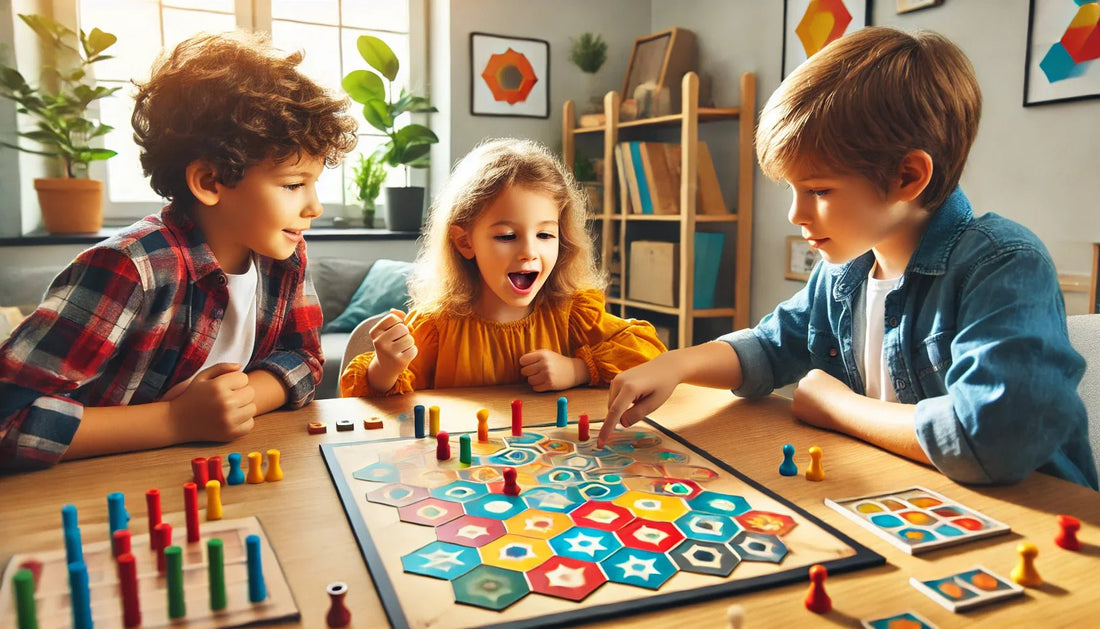
Gifted games: fun, learning and development – all in one
Share
Gifted children need challenges that offer more than just fun. Games that engage both the mind and the heart can be the perfect tool for nurturing dormant talents.
Learning doesn't have to be boring, especially for gifted children and young people. The right games challenge them mentally—while simultaneously stimulating creativity and the joy of learning.
According to various studies, there are no more gifted people among those with ADHD. Conversely, the number of undiagnosed/untreated people with ADHD, or those living against their nature, is probably also high. Highly gifted children from this group would therefore go undiagnosed. Because they are likely the most noticeable "disturbers" of all. No wonder.
Smart minds play differently
Gifted children often present their parents with unique challenges. They think faster, question more, and get bored more easily. Classic games like memory or simple puzzles are usually not enough to satisfy their curiosity.
Gifted games offer a solution. They combine fun with intellectual challenge, promote creative thinking, and even strengthen social skills. At the same time, they provide children with enjoyment without overwhelming them.

What are gifted games?
Gifted games are more than just entertainment. They were developed to stimulate deep, interconnected thinking, creativity, and problem-solving skills. Unlike traditional educational games, they don't offer standardized solutions but encourage lateral thinking. Examples include strategy board games, complex puzzles, or creative DIY projects. These games provide targeted stimulation that challenges gifted children and promotes their intellectual development. They often also offer different difficulty levels, allowing children to be supported individually.
How do games promote cognitive skills?
Gifted children think more complexly. That doesn't mean they "overcomplicate things." Many things in life—like economics, psychology, or politics—ARE complicated. It means they see what others DON'T. In other words, they see more (that's the problem with the term "normal." At best, it signifies mediocrity. But gifted children are the intellectual elite).
They love looking at problems from different perspectives. Games like chess or challenging puzzles promote precisely that: analytical skills, patience, and strategic thinking. Creativity-enhancing games like storytelling or construction sets also awaken the ability to make new connections.
Combined with fun, learning becomes a game. Games that combine logical processes with creativity are particularly suitable – for example, building a fictional city or developing your own rules for a game.

The best categories for bright minds
Gifted children have different strengths. Therefore, different game types offer tailored challenges:
Logic and thinking games: Classics like Sudoku, Tangram, and challenging puzzles promote patience and pattern recognition. Logic games with multiple solutions also stimulate the imagination.
Strategic board games: Games like "The Settlers of Catan," "7 Wonders," or "Terraforming Mars" teach forward-looking planning and interaction. Children learn to think long-term and reflect on their decisions.
Digital games: Apps like "Monument Valley" and "Civilization" combine puzzle fun with technological understanding. They often offer interactive environments that encourage children to think creatively and solve logical challenges.
Social games: Role-playing and group games promote teamwork, negotiation skills, and emotional intelligence. These games are especially important for strengthening social skills and promoting empathy.

The best games for gifted children
Not every game is suitable for every age or interest. Parents and teachers should choose age-appropriate games:
For children up to 6 years old: Games like "Color Code," "Smart Games," or "Kunterbunt" promote visual logic, color theory, and concentration. Interactive games with bright colors or shapes stimulate the imagination.
For school children: “Qwirkle” and “Rush Hour” combine logic and strategy, while games like “Ubongo” also challenge spatial thinking.
For teenagers: "Terraforming Mars," "Codenames," and "Pandemic" challenge strategic thinking and teamwork. They also allow for playful exploration of real-life topics such as environmental protection and communication.
It's all about the mix: games that combine creativity, thinking, and social interaction offer long-term learning effects while being fun in a group.
Do it yourself: DIY games for gifted children
Homemade games are not only inexpensive but also unique. With simple materials like cardboard, paint, and small parts, exciting projects can be realized:
Word Stack: A stacking game in which each word must begin with a specific letter. Variations such as a time limit or themes increase the challenge.
Idea Finder: Cards with random words encourage creative storytelling. Complemented with picture cards or topic suggestions, it becomes even more engaging.
Puzzle Cubes: Custom-labeled cubes offer endless combination possibilities for logic puzzles. Children can design their own puzzles and thus expand their creativity.
Escape room games: With just a few tools, you can create mini-adventures in which puzzles must be solved in order to “escape” a room.
DIY games are fun and encourage children's initiative. They can also be adapted to specific interests, offering tailored challenges.

Scientific Insights: Why Games Work
Various educational studies show that games promote important problem-solving skills . Highly gifted children particularly benefit from games that challenge their curiosity and openness, or rather, their brains in general. Neuroscientists have proven that playful challenges strengthen synapse formation and concentration. At the same time, experiences of success increase motivation.
Social skills also benefit: Board and group games promote teamwork, empathy, and communication. Games that include cooperative elements help children resolve conflicts and achieve common goals. Games that simulate real-life problems—such as climate protection or technological innovations—are particularly noteworthy. These not only promote logical thinking but also an understanding of complex relationships.
Conclusion: Promote talents through play, develop potential
Gifted games offer much more than just entertainment. They promote thinking skills, creativity and social skills - and open up new horizons for children and young people.
Whether it's a logic puzzle, a 3D Maze Ball , a strategy board game, or a DIY project , the right choice brings fun and lasting learning. Parents and teachers who take advantage of these opportunities create ideal conditions for optimally supporting gifted children. A well-chosen game can lay the foundation for lifelong learning and enthusiasm.
